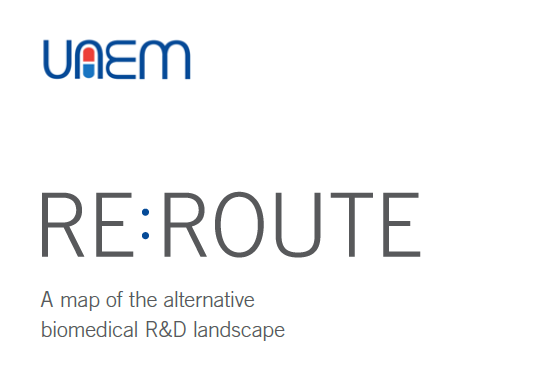
Universities Allied for Essential Medicines (UAEM) launches Re:Route, a mapping of alternative biomedical research and development (R&D) initiatives.
Washington, D.C., February 24, 2016 — Today, Universities Allied for Essential Medicines (UAEM) is launching Re:Route, a mapping of alternative biomedical research and development (R&D) initiatives. Launched in time for the United Nations High Level Panel on Access to Medicines dialogue in March 2016, www.AltReRoute.com provides a qualitative review of alternative biomedical R&D initiatives around the world. This student-driven project provides evidence of the need to start a truly game changing dialogue that focuses efforts on people oriented and needs-driven biomedical R&D.
The crisis of high drug prices, antimicrobial resistance and tragic events like the Ebola emergency and now Zika, all point to the need for a fundamental change in the way medicines are researched and developed. Under the current profit-driven system, approximately 1 in 3 people around the world lack access to essential medicines. Neglected diseases, which primarily affect the world’s poor, only receive 2% of the funds invested in R&D annually, at the same time new blockbuster drugs such as Gilead’s Sovaldi are being priced at $84,000 for a 12 week treatment in the Unites States.
Re:Route investigates existing and proposed alternative R&D initiatives which purport to address the failings of the current system. The mapping is not intended to be fully comprehensive but covers 81 initiatives that fulfilled at least one of the accepted alternative mechanisms. These were delinking prices from costs of R&D, ensuring open source and data sharing, and collaborative approaches as well as push, pull, and/or pool mechanisms. “81 initiatives may seem impressive. But people are still dying because they cannot afford medicines or there is no market for the medicines they need,” said Rachel Kiddell-Monroe, Special Advisor to UAEM and member of Medecins Sans Frontières’ International Board. “Evidently, these 81 initiatives do not represent the answer to the access crisis.”
Overall, the mapping reveals a lack of fundamental systemic change in biomedical R&D. While some initiatives have undoubtedly made important advances on specific diseases and systemic issues, others are simply promoting a “business as usual” approach. However, “Some of the more successful initiatives we mapped may provide the building blocks for a new approach to biomedical R&D,” said Alexandra Greenberg, a student leader at UAEM and a co-author of Re:Route. “As a student, I firmly believe that universities have a fundamental role to play in ensuring that these building blocks become part of the new normal in R&D.”
The Ebola outbreak epitomizes the pitfalls of the current piece-by-piece approach to needs-driven R&D. A potential Ebola treatment was not developed for use because there was no financial motivation for pharmaceutical companies. “Now more than ever, we have an historic opportunity and major responsibility to help drive transformative biomedical R&D that serves people over profits,” said Merith Basey, Executive Director of UAEM North America. “We aspire for this mapping to be a key tool for students and researchers to help them better understand the current R&D landscape and be better equipped to lead the change necessary to tackle the system at its core.”
Source: UAEM